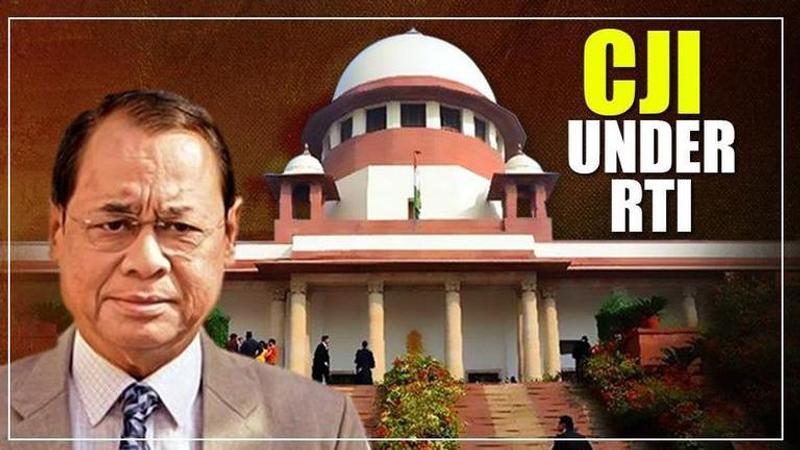Published 13:59 IST, November 13th 2019
MASSIVE: SC brings CJI's office under RTI, upholds Delhi HC's 2010 order
Delivering a landmark judgment on Wednesday, the Supreme Court upheld the Delhi High Court decision bringing the office of the CJI under the ambit of RTI

Delivering a landmark judgment on Wednesday, the Supreme Court upheld the Delhi High Court decision bringing the office of the chief justice of India (CJI) under the ambit of the Right to Information (RTI) Act. A five-judge constitution bench headed by Chief Justice Ranjan Gogoi has pronounced the judgement observing that the Office of CJI comes under “public authority”. Other members of the bench are Justices N V Ramana, D Y Chandrachud, Deepak Gupta and Sanjiv Khanna.
In a 3:2 split verdict, the SC bench said that as per RTI's provision - the CJI falls under the definition of public authority. The top court added that Public interest demands transparency and that it does not undermine judicial independence. While Justice Khanna wrote the majority verdict, Justices Ramana and Justice Chandrachud wrote separate and concurring verdicts. However, the top court said that RTI should not be used as a tool for surveillance.The 5-judge bench also said that judicial independence can't be achieved by denying information, adding that independence and accountability goes hand in hand.
The top court highlighted that judges are not precluded from the rule of law as they hold a constitutional position including the CJI. However, the apex court underlined that the RTI does not fall under Article 19 and therefore transparency cannot be allowed to run counter to the right to privacy.
The apex court had on April 4 this year reserved its verdict on the appeals filed in 2010 by the Supreme Court secretary-general and its central public information officer against the high court and the central information commission's (CIC's) orders. The bench, headed by the chief justice, had wrapped up the hearing, saying nobody wants a "system of opaqueness", but the judiciary cannot be destroyed in the name of transparency.
2010 verdict by Delhi High Court
In a path-breaking verdict on January 10, 2010, the Delhi High Court had held that the office of the chief justice of India comes within the ambit of the Right to Information (RTI) law, saying judicial independence was not a judge's privilege, but a responsibility cast upon him. The 88-page judgement was then seen as a personal setback to the then CJI, KG Balakrishnan, who has been opposed to disclosure of information relating to judges under the RTI Act. The high court verdict was delivered by a three-judge bench comprising Chief Justice A P Shah (since retired) and Justices Vikramjit Sen and S Muralidhar.
READ: 5 major judgments CJI Gogoi is likely to deliver before his retirement
The move to bring the office of the CJI under the transparency law was initiated by RTI activist S C Agrawal. His lawyer Prashant Bhushan had submitted in the top court that though the apex court should not have been judging its own cause, it is hearing the appeals due to "doctrine of necessity". The lawyer had described the reluctance of the judiciary in parting information under the Right To Information Act as "unfortunate" and "disturbing", asking: "Do judges inhabit different universe?" He had submitted that the apex court has always stood for transparency in the functioning of other organs of State, but it develops cold feet when its own issues require attention.
Updated 16:25 IST, November 13th 2019




